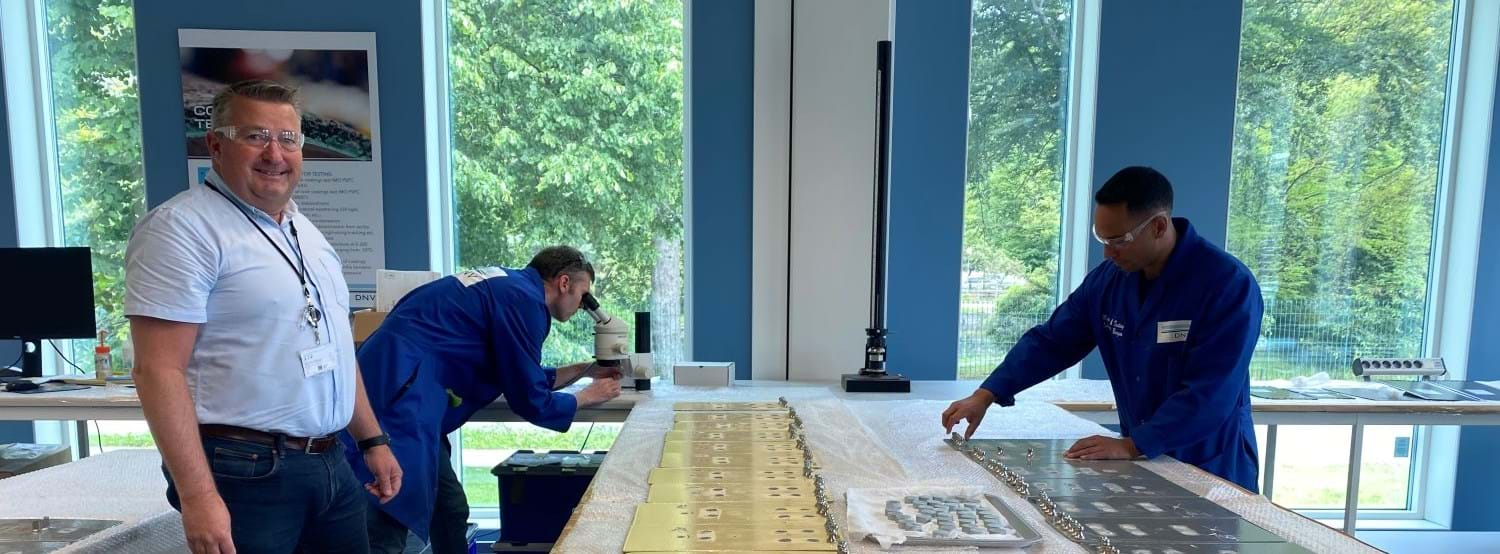DNV: Together for a faster energy transition

– We want to enable our customers and collaborators to handle the energy transition faster.
These are the words of Mads Arild Eidem, Head of Section Materials & Testing and site leader for DNV in Bergen. Last year, the company merged its oil, gas and renewable energy businesses into a new business area called Energy Systems.
– We established Energy Systems because many companies in the energy market are changing rapidly and are in search of better solutions for decarbonisation. By combining our expertise, we can provide better services to those of our customers who operate in or are entering the energy industry. This new structure ensures that we can serve all parts of this market.
Faithful partner
DNV became a partner in NCE Subsea when the cluster was established in 2006 and has been through the transitions with name changes and strategic course changes to the current GCE Ocean Technology. Eidem has been a board member for two years and has helped shape the cluster's activities and focus areas.
– DNV wants to be closely associated with industrial actors, academia and the maritime environment in Bergen. That's why a partnership in GCE Ocean Technology is important. Both to establish networks, but also to gain new knowledge, new experiences and to learn from others.
This was also one of the reasons why DNV Bergen in 2016 decided to move to the city's marine power center at Damsgårdssundet. The office building "Basen" is part of the knowledge cluster on Marineholmen, while the footbridge "Småpudden" leads over to the other side of the strait where DNV has a laboratory of over 2000 square meters for large-scale testing.
Future-oriented business
The merger into Energy Systems reflects the energy structure of the future, where renewable energy, carbon capture and storage are central.
– DNV has a special focus on the green shift, both internally and externally. We will contribute to nations and companies being able to achieve their set goals, says Eidem.
But he points out that even though the greatest growth is expected in the renewable segment, DNV will continue to work with oil and gas to assist in the transition to a low-carbon society. Natural gas will probably be the largest energy source until 2050, while hydrogen, ammonia and carbon capture and storage will be important tools for use in the sectors where the shift offers greater challenges.
Concrete results
For DNV, it is of great value to be connected to the GCE Ocean Technology network. Among other things, it provides knowledge about local and national industries, technologies and innovations.
– We have established many new relationships with groups we did not know before. This has resulted in specific projects and activities for us, other member companies and the cluster itself. We have also been able to start early-phase projects through guidance, and we have received financial support thanks to the membership, says Eidem, who is particularly concerned that entrepreneurs should be able to get over the hurdle and accelerate.
– Entrepreneurial companies often have difficulties with gaining the trust of investors and customers for an idea or a product. Then you have to show maturity and make sure that the product will work as intended. A technology qualification based on DNV's framework can be a good help along the way. Here we assist with knowledge and support to the member companies.
Important interaction
DNV invests heavily in research and development to find solutions in line with the industry - solutions that address strategic, operational and regulatory challenges.
– We want to use GCE Ocean Technology as a common arena where we learn to understand the needs of the industry. We must benefit from each other's knowledge and cooperate in the global competition. It can be difficult to get access to good ideas in the market. All the more important is the cluster as an engine where different actors are connected in specific projects and in marketing activities, says Mads Arild Eidem.
Contact Information


Facts
DNV is a global company in quality assurance and risk management with a presence in over 100 countries, with headquarters in Norway at Høvikodden in Bærum.
- A world-leading supplier of everything from risk management to safety for ships, processing plants and offshore installations.
- DNV helps companies make good decisions and increase confidence in their business, products and services.
- The company is owned by the Det Norske Veritas Foundation, which since 1864 has had the purpose of securing life, values and the environment.
- DNV has around 13,000 employees worldwide.
About
DNV is one of 18 partners from industry, R&D, academia and public bodies, which has recently signed a new 5-year agreement with GCE Ocean Technology.
The partners in the cluster are the leading force, and the backbone of the cluster's strategic work.
The partners get access to various arenas and projects where they meet potential customers, suppliers and partners. Here, valuable knowledge is developed and shared between the cluster's +150 partners, members and collaborators.
